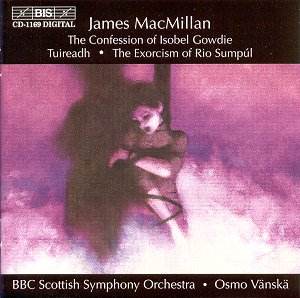At last! This was my initial reaction to BIS’s latest
release in their MacMillan series. Although Jerzy Maksymiuk’s 1992 recording
of The Confession of Isobel Gowdie has served the catalogue well
for a decade (and indeed helped the piece reach a much wider public),
I always had a feeling that more justice could be done to the work.
The orchestra is the same as that earlier Koch recording (and the world
premiere), but they now have the piece well and truly in their system.
The recording quality is also a step up, and reveals even more depth
and beauty in MacMillan’s orchestral palette.
Vänskä has latterly turned the BBC Scottish
S.O. into a really world class band. The rapt modal string threnody
near the start of the piece (a sort of neo-Tallis Fantasia) affords
us a taste of the string sonority they can now produce. This very passage
has more urgency on the earlier disc, but is a whole lot scrappier in
execution. In fact, it sounds at times like a run through, complete
with extra studio noise (knocking of stands, shuffling etc.). This new
version comes at us from a great distance, wonderfully atmospheric and
hushed. Vänskä takes his time, leading us through the clear
narrative of the programme (the martyrdom of a Catholic ‘witch’) with
unerring concentration. The cumulative effect, especially as the tension
mounts towards the horrifying climactic immolation, is vividly realised,
and he better integrates the undisguised echoes of other composers into
the texture. Listeners unfamiliar with the piece may be taken aback
at the clear references to Copland, Messiaen, Stravinsky (the eleven
hammered-out crotchets from The Rite), and, most tellingly of
all, the famous single-note crescendo from Berg’s Wozzeck with
which Isobel Gowdie ends. Don’t let this put you off; MacMillan’s
self-styled pluralism is as emotionally direct as anything in Mahler
and Shostakovich, composers with whom he has a strong affinity. In the
final analysis, Vänskä gets us to that emotional core more
effectively, and one is wrung dry by the end. The feeling that MacMillan
is writing from the heart is borne out by his words in the published
score, "the work … offers Isobel Gowdie the mercy and humanity
that was denied her in the last days of her life. This work is the Requiem
Isobel Gowdie never had".
The two companion works on the disc are particularly
appropriate, coming as they do from a year either side of Isobel
Gowdie. The Exorcism of Rio Sumpul, written in 1989, may,
at first, seem to be a dry run for the later piece, but though it was
similarly composed in reaction to a shocking event, the overall effect
is more positive. The background, as Stephen Johnson’s excellent note
tells us, is thus: in 1986, the El Salvador army made a savage helicopter
attack on a village in the valley of the River Sumpul. Surprisingly
no one was killed, and as the villagers emerged from hiding, the parish
priest began a bizarre comic dance, eventually joined by the whole village
as they rejoiced at being spared, and exorcising the trauma of the attack.
It amounts to a short three-movement symphony, with individual sections
entitled ‘Assault’, ‘Reflection’ and ‘Exorcism’. Originally scored for
chamber forces, it here gets a taut, direct and strikingly bold performance
in its full orchestral guise.
There is also a clear link to the third piece, Tuireadh
for clarinet and strings (originally string quartet), which dates from
a year after Isobel Gowdie, but was again a highly personal artistic
reaction to a great tragedy, this time much closer to home. Tuireadh
is Gaelic for lament, and was written in response to the Piper Alpha
explosion, in particular a letter MacMillan received from the mother
of one of the victims. She described to him the memorial service held
at the scene of the tragedy, and told how "a spontaneous keening
sound rose gently from the mourners assembled in the boat". This
is clearly reflected in the music, which is full of ‘keening’ sounds
from the clarinet, as well as a ‘sighing’ motif which recurs hypnotically
in the strings. One could take this as the endless swell of the sea
(or maybe the ‘endless’ quality of grief?), and certainly pictorial
images are very audibly represented – even the seagulls are present
in the high clarinet shrieks. This is a very personal response to a
very public disaster, and the restless nature of the music, by turns
violent and contemplative, sobbing and wailing, gives us a harrowing
yet deeply felt picture of the devastation it caused. The performance
is exemplary, with Martin Fröst’s virtuosic clarinet played with
a controlled frenzy that is direct and powerful.
This is a welcome continuation of BIS’s MacMillan series,
and is well up to the house standards. Liner notes, as mentioned, are
perceptive and readable, and recording quality outstanding, with a fullness
and bloom to the sound that is ideal.
Even if you have the valuable first recording of Isobel
Gowdie (also well coupled with Tryst, but much shorter playing
time), lovers of the approachable face of contemporary music should
snap this up.
Tony Haywood


